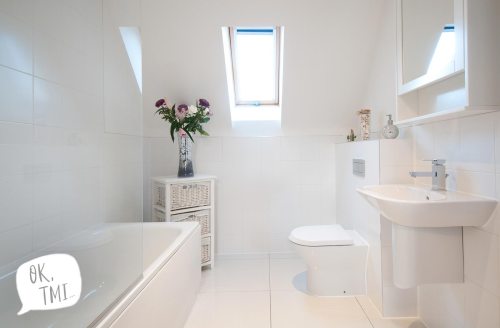OK, TMI: Why do I get ‘stage fright’ when I pee?
Stage fright when urinating is actually a pretty common phenomenon. Here, a urologist shares why it happens, and what you can do about it.

I find that some of the most interesting assignments I get are when they start out with a Slack message that says: “Don’t hate me but…” Then an assignment comes through about things like why people cry when they poop, or what happens if you ingest period blood during a sexcapade. This most recent one, about getting stage fright when urinating, hit a bit differently though.
See, I myself suffer from this phenomenon. Pre-pandemic, whenever I would have a guy over, or be over at their place, I would get this particular kind of stage fright. Once in the bathroom, it would take a bit for me to actually be able to pee—even if I really had to go. Peeing in a public restroom—like an office bathroom or a restaurant—also invoked similar fears.
“‘Peeing stage fright’ aka ‘shy bladder’ is a very common condition that I see as a urologist,” says Lamia Gabal, MD. It’s a form of social anxiety called paruresis, and it impacts an estimated 7 percent of the U.S. population. Paruresis is often rooted in a person’s fear of being judged or criticized by others for what they do in public—in this case, peeing.
How it works: Anxiety can cause muscle spasms, Dr. Gabal says, which can cause headaches or back or neck pain, depending on the person. However, anxiety—specifically feeling anxious about peeing where others can hear—can impact the pelvic floor, which can have a trickle-down effect on your peeing habits. “The urethral sphincter muscle, which helps you to hold in your urine, is part of the pelvic floor. It is supposed to relax when your bladder squeezes,” says Dr. Gabal. “In times of anxiety, the sphincter contracts and is unable to relax, so the bladder is trying to squeeze against a closed sphincter, thereby delaying or even preventing someone from being able to pee when anxious.”
Not being able to pee due to a contracted urethral sphincter (try saying that three times fast) is called dysfunctional voiding, Dr. Gabal says. It’s most common in children, but can happen to adults, particularly to people with type-A or anxious personalities are more prone to experiencing this.
This might seem trivial, but having a shy bladder can majorly impact a person’s life. A person might feel like they have to “hold” their pee until they have complete privacy, which can have health consequences if done for too long or too often. “In its most severe state, [paruresis] can lead to pelvic pain, urinary tract infections, urinary incontinence and even renal failure,” Dr. Gabal says, though she notes that the last one is rare.
However, having a shy bladder doesn’t have to be a permanent thing. “In order to improve the situation, I would recommend that you practice relaxation techniques while at home, under non-stressful situations,” Dr. Gabal says. “Meditation, deep breathing, and even yoga can help with all kinds of muscle relaxation.” And that, in turn, can help calm down your pee muscles. Other helpful at-home options include soaking in a tub or applying heat to the area, she says.
If this is a problem that really bothers you, Dr. Gabal recommends seeing a urologist, who can ensure that there’s nothing else of concern going on and to help with symptoms. To address the anxiety portion of the equation, working with a therapist trained in cognitive behavioral therapy (CBT) can help. (Both of these things will likely have to wait until stay-at-home orders have been lifted, though.)
In related news, I’m going to start meditating so that when I’m finally out and about around people again, I’ll be able to pee without getting stage fright. Seems like a valid quarantine goal.
Sign Up for Our Daily Newsletter
Get all the latest in wellness, trends, food, fitness, beauty, and more delivered right to your inbox.
Got it, you've been added to our email list.










